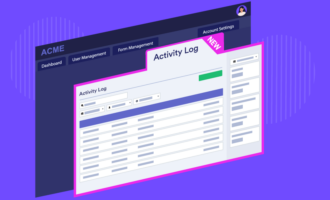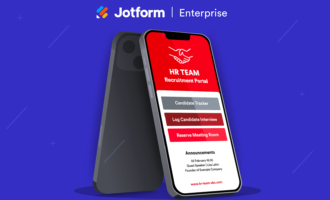6 key benefits of single sign-on (SSO)
- Ease of access
- Better usability
- High level of security
- Reduced reliance on IT
- Easier regulatory compliance
- Seamless integration
Whether you’re trying to log into an expense form program at your business or struggling to remember that password you keep forgetting for your favorite streaming service, dealing with logins and authentication can be stressful.
As a result, many companies turn to single sign-on technology for secure, consistent, and easy access to multiple platforms within their organizations. The benefits of single sign-on allow for much greater flexibility and efficiency in the ways businesses manage and track their internal data.
Understanding SSO and its benefits
Single sign-on, or SSO, is an access control technology that allows a user to log into several different but related systems using a single pair of credentials to identify themselves. These types of services operate using what’s called an “authentication token,” which is a unique identifier that reminds the interconnected programs you’re verified to access them.
SSO technology is particularly popular (and handy) for sensitive industries or digital ecosystems like banking, healthcare, or education — the types of institutions that don’t take chances when it comes to their data. The SSO database acts as an ultra-secure intermediary that oversees permissions and access, without requiring individual employees to regularly access the database themselves. This provides security and accessibility all at once.
Considering the many benefits of single sign-on, let’s take a look at the six biggest boosts this tool can deliver from the moment you implement it.
1. Ease of access
One of the most common benefits of single sign-on capabilities — and what makes it so popular for all industries — is how the tool makes access to multiple programs, documents, or interfaces so simple. Employees don’t need to rely on password requests or have to repeatedly log in to access essential programs or company materials.
As a result of this accessibility, the rest of your business will flow seamlessly. After all, fewer roadblocks to various resources leads to more efficiency.
2. Better usability
In some instances, SSO solutions are leveraged through an app portal that connects all essential corporate tools in one interface. SSO is the foundation for creating a streamlined operation (like an app portal), which lets small businesses consolidate resources — such as expense processing, budgeting, and project management — through fewer channels when possible.
What’s more, this increased accessibility encourages users to engage with apps they otherwise wouldn’t have. This empowers your employees to interact more often with the tools at their disposal, using them more frequently and improving the quality of their work (or at least the speed at which they complete it).
3. High level of security
At its core, SSO is a security measure that makes access straightforward yet sensitive. The key to this added level of security is the previously mentioned “authentication token.” Using this authentication as a layer of protection, the token gets stored directly with the SSO’s server or database, rather than with the individual resources (i.e., any business software or program) that the user would need to access.
With this method of authentication, your security doesn’t have to rely on the resource in question to store or cache login data. For instance, within a healthcare organization, a user might require access to a patient database, an insurance provider, and an administrative log. These three disparate systems require both strict security and easy access. SSO measures can centralize and protect the authentication tokens, ensuring the resources or programs can simply exist to serve their function (and not to remember login credentials).
4. Reduced reliance on IT
IT departments are invaluable for modern companies — but employees still too often feel the need to lean on them for help. By centralizing company access with SSO, users could reach out to IT for access or password reset requests at a far lower rate. For software-as-a-service (SaaS) industries, or those that rely heavily on digital infrastructure, freeing up IT is pivotal.
And the benefits of single sign-on for IT departments go beyond just reducing the number of tickets. These tools are often part of a larger unified access management system, which helps IT track and create rules for users based on employment and clearance level, location, and more. These preset criteria help better manage and distribute access and information across the company as needed.
5. Easier regulatory compliance
Depending on the industry, companies have to deal with strict compliance standards, like HIPAA for healthcare or Payment Card Industry Data Security Standard (PCIDSS) for digital transactions. In using programs that adhere to these regulations, SSO allows for the easy management of users’ access levels and protects your company’s standing against any and all compliance.
Compliance, especially within digital resources, is essential. Without meeting these standards, hefty fines and burdensome restrictions can stifle a business from continuing its operations. Financial institutions like those in the banking industry are particularly vulnerable to compliance issues, which can often stem from mismanagement of user access. With SSO, these issues become much less likely, and compliance is a much easier process to manage.
6. Seamless integration
SSO is well-known for improving accessibility and making businesses of all kinds more efficient. To make this possible, your SSO program itself needs to integrate with the various resources your organization relies on.
Luckily, most SSO programs are carefully constructed to work seamlessly with multiple programs and integrate into existing work systems with little issue. Some are pre-designed for specific industries like healthcare, but even generalized programs can provide widespread, secure access within your company with no hurdle in implementation.
Leveraging Jotform and single sign-on
Whatever your reasoning behind using SSO technology, be sure to also take advantage of programs and form builders that make the most of these tools. With Jotform Enterprise, a digital productivity workspace, building powerful forms for your business with SSO compatibility is easier than ever. With Jotform, your employees can access and manage their forms with just one set of login credentials, regardless of your industry.
You can’t overlook the benefits of single sign-on when pondering an IT upgrade for your organization. Take the time to explore SSO tools and consider investing in them, and you too can make life easier for practically every member of your company.
Photo by: prostooleh



























Send Comment: